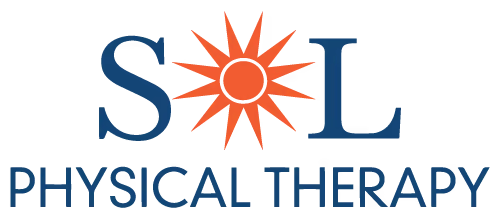Pelvic Floor Therapy
Pelvic Floor Therapy at Sol Physical Therapy: Restoring Comfort and Confidence
Specialized Care for Pelvic Health
Sol Physical Therapy offers expert pelvic floor therapy to address a variety of conditions affecting pelvic health. Our dedicated team of therapists provides compassionate and effective treatment for individuals experiencing pelvic pain, bladder and bowel dysfunction, pelvic organ prolapse, and other pelvic floor disorders.
What is Pelvic Floor Therapy?
Pelvic floor therapy focuses on evaluating and treating dysfunctions of the pelvic floor muscles, ligaments, and connective tissues. Our therapists utilize a combination of manual techniques, biofeedback, therapeutic exercises, and education to alleviate symptoms, restore function, and improve quality of life.
Conditions We Treat
- Pelvic Pain: Addressing discomfort in the pelvic region, including pain during intercourse, sitting, or bowel movements.
- Bladder Dysfunction: Helping individuals manage urinary urgency, frequency, leakage (incontinence), and retention.
- Bowel Dysfunction: Providing strategies to improve bowel movements, manage constipation, fecal incontinence, or pelvic floor dyssynergia (difficulty with bowel movements).
- Pelvic Organ Prolapse: Supporting individuals with pelvic organ descent or bulging sensations due to weakened pelvic floor muscles.
- Pregnancy and Postpartum Issues: Assisting with pelvic pain, urinary incontinence, and other pelvic floor concerns before and after childbirth.
- Pelvic Floor Dysfunction: Treating muscle tension, weakness, or coordination issues in the pelvic floor contributing to various symptoms.
Our Approach
- Comprehensive Evaluation: We conduct a thorough assessment to identify the underlying causes of pelvic floor dysfunction and tailor treatment to individual needs.
- Specialized Treatment Techniques: Our therapists employ manual therapy, myofascial release, trigger point therapy, and other hands-on techniques to address muscle imbalances and promote relaxation and strength.
- Biofeedback and Therapeutic Exercises: We utilize biofeedback technology to help individuals better understand and control pelvic floor muscle function. Therapeutic exercises are prescribed to improve muscle coordination, strength, and endurance.
- Education and Lifestyle Modifications: We provide education on anatomy, bladder and bowel habits, posture, breathing techniques, and ergonomic principles to optimize pelvic health.
- Collaborative Care: We may collaborate with other healthcare providers, such as urologists, gynecologists, or pelvic floor physical therapists, to ensure comprehensive care and achieve optimal outcomes.
Why Choose Sol Physical Therapy for Pelvic Floor Health?
- Expert Pelvic Floor Specialists: Our pelvic floor therapy experts offer the best care in Southern Arizona, combining specialized training with sensitivity and professionalism.
- Evidence-Based Approach: We incorporate the latest research and best practices in pelvic health to deliver effective treatment tailored to individual needs.
- Comfortable Environment: We create a safe, supportive and private space where individuals can discuss sensitive issues and receive personalized care.
- Empowering Solutions: We empower individuals with knowledge, skills, and strategies to manage their pelvic health and improve their overall well-being.
Take Control of Your Pelvic Health
Don’t let pelvic floor issues affect your quality of life. Sol Physical Therapy is here to help you restore comfort, confidence, and function. Contact us today to schedule an evaluation and start your journey toward pelvic health and wellness.
Meet Our Specialists

Molly Mikles, PT, DPT
Molly has over 20 years of experience as an Orthopedic Physical Therapist, and has been specializing in pelvic floor therapy for over 15 years. An Arizona native, Molly grew up in Tucson, attended the U of A for her B.S. in Exercise Science, and earned her Doctorate in Physical Therapy from NAU. Her pelvic floor specialty involves treating both men and women for conditions of the pelvic floor. She is certified in Graston, a form of Instrument Assisted Soft Tissue Mobilization, as well as Kinesio Taping, a treatment used for a wide range of orthopedic conditions.
Molly enjoys spending time with her two boys, hiking and enjoying the outdoors, and completing DIY projects around her house.
What Our Patients Say...











I was very happy with my experience here. The staff was friendly and helpful. My therapist was excellent. All over a wonderful place to get therapy! Highly recommend!
- Holly W. (via Google Reviews)
I see 3 of the physical therapist there and feel like part of the family. I am treated with respect and my pains are very serious to them as they always put me first. Thank you SOL Physical Therapy!
- Dawn R. (via Google Reviews)
I have been to many different physical therapy places but of all the ones I have been to, I must say, SOL Physical Therapy is the best. All the therapists, techs and front office personnel are unbelievably friendly, knowledgeable and always willing to assist you and your questions. They never try and rush you through your therapy (and I have been places where that was definitely the case). I would recommend SOL to anyone that needs physical therapy, they are top notch!!
- Debbie A. (via Google Reviews)
Sol Physical Therapy is such an incredible place to go for physical therapy. I have been going for over a year and have never once had a problem. Everyone from the front desk staff, to the techs, to the physical therapists are extremely helpful, care about the patients, and will do whatever is needed to support you as the patient.
- Aimee K. (via Google Reviews)
We brought our 4 month old in to see AJ for torticollis. I am beyond happy we found this place as AJ was AMAZING with our son. He was personable and explanatory with everything and our son smiled so much during our visit while he was checking out his range of motion and doing stretches. We have upcoming appointments and though he is booked out a good month in advance it is WORTH the wait ten fold ⭐️⭐️⭐️⭐️⭐️
- Tali B. (via Google Reviews)
I have had the pleasure of seeing Stephanie L, Dan, Rachel, and Joe at the Fort Lowell location. They are all extremely knowledgeable and know how to make the experience fun, even when you are in pain. I would (and have) highly recommend them to anyone who needs PT or OT. Kailey at the front desk is always very kind and willing to help as well.
- Sarah G. (via Google Reviews)
The staff is amazing. Very knowledgeable therapists. The front office staff is very friendly. I can’t say enough about the practice but thank you to everyone.
- Paulla N. (via Google Reviews)
We took our daughter here to get evaluated for her torticollis. The staff was very friendly and helped us get set up with a few appointments at once. Our physical therapist AJ was very informative and was gentle with our baby. Definitely looking forward to coming back for future appointments.
- Nick T. (via Google Reviews)
I would not choose another place! Very professional and goes beyond to get you in at your convenience!
- D. A. (via Google Reviews)
The BEST! Philip is my Vestibular/Physical therapist. I have been diagnosed with bilateral, Superior Canal Dehiscence. Migraines, balance problems, hearing loss, the whole 9 yards. After a procedure to correct one side (done at UCLA), I had to find a "VRT". My husband and I absolutely love the results and improvements in my daily life. Thank you Philip, Patrick, Jessie, Jessa, A.J, Matt and Sharon, for the help you all provide to your patients!!
- D. Val (via Google Reviews)
We picked this physical therapy business randomly as it was close to home and they take my insurance. As it turned out, we were very pleased. The staff was very efficient and friendly. The thing that pleased me most was that they asked how things went since the last session. Then based on what I said, they tailored the day's exercises.
- Barbara S. (via Google Reviews)

